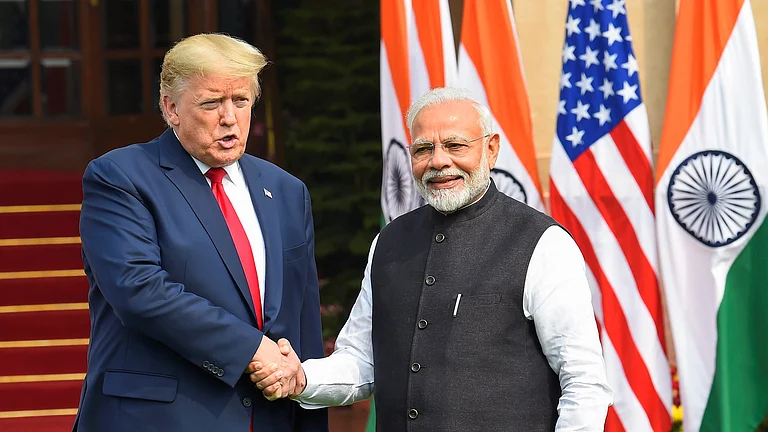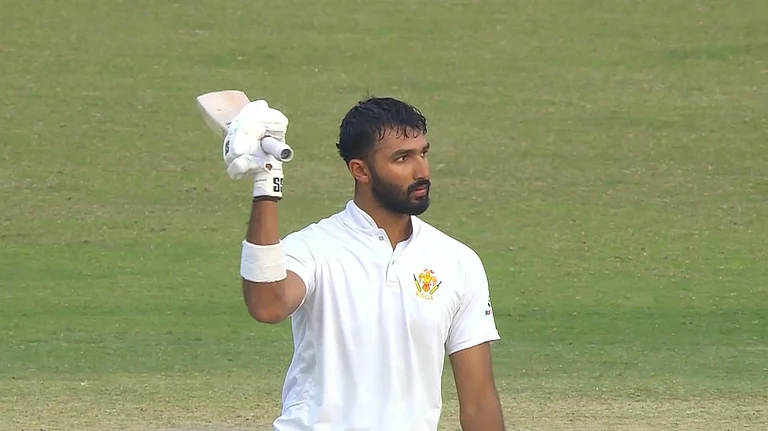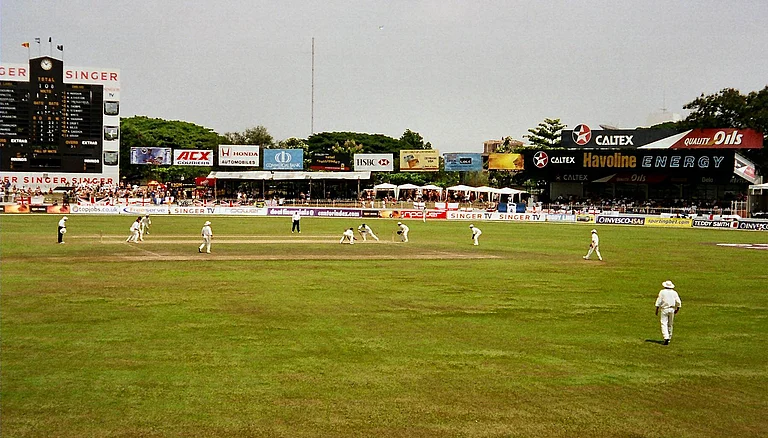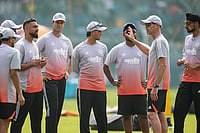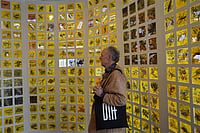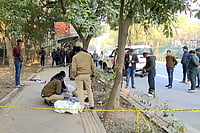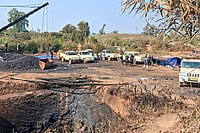Noam Chomsky, USA, wasrecently interviewed by Paranjoy Guha Thakurta on the CNBC India televisionchannel, during his India visit. Following is the (veryslightly edited) transcript of the interview broadcast first on SaturdayNovember 3, 2001 and again on MondayNovember 5, 2001.
Introduction: Hello and welcome to Cutting Edge Perspective. I am Paranjoy GuhaThakurta in the Ashok Hotel, New Delhi and the guest on the programme isProfessor Noam Chomsky. Professor Chomsky is much more than a professor oflinguistics at the Massachusetts Institute of Technology, with which institutehe has been associated for four and a half decades. Prof Chomsky is arguably oneof the most trenchant critics of the American establishment and one of thefinest intellectuals of our time.
Question: Professor Chomsky, thank you for granting this interview. Ata time when American planes are bombing Afghanistan, at a time when we hearspokespersons of the Bush administration talking about continuing operationsright through the month of Ramzan, what do you see as the future of Afghanistan?
Chomsky: The future of Afghanistan is very grim. The past twenty years hasbeen a period of horror. the Russian invasion, the US-British-French-Egyptianorganised mercenary force of radical Islamists were not organised to saveAfghanistan but to harass theRussians. Between them, they tore the country toshreds. In the 1990s, things got worse. Even beforeSeptember 11, five or six million people were facingstarvation and were being kept alive by food suppliesfrom international agencies. Immediately afterSeptember 11, the national press in the United States,the New York Times, announced that the Bushadministration had demanded that Pakistan stop sendingfood to Afghanistan. International aid workers werewithdrawn under the threat of bombing. The populationstarted fleeing.
Q: I want to interrupt you. What the Americans are nowdoing is that they are not just throwing bombs inAfghanisation, they are also dumping food packets.
Chomsky: (Dropping of) food packets have been bitterlycondemned by every international agency, the RedCross, the World Food Programme, the UN specialrapporteur on food. Not only are they meaningless,they are probably harmful. They are harmful becauseevery agency has pointed out that if you want to doair-drops, you have to prepare the ground, you have tomake sure there are people there to distribute (thefood), you have to make sure that people don't go todangerous areas but to safe areas and you have to makesure that the people who will receive the food arethose who need it - the women, the children, the illand so on -- and not men who would take the food andsell it in the bazaar. The food drops have beensubject to scathing condemnation by just about everyaid agency and international authority. If anything,they are harmful. The food that should come in shouldbe trucked in and that has been sharply cut backbecause of the withdrawal of the aid agencies. Sincethe bombing, the estimates are that the number ofpeople facing imminent starvation has gone up by 50per cent and that's 2.5 million people. We don't knowwhat will happen but those are the assumptions onwhich policy is based.
Q: Let us try and anticipate what may happen. In thelate-1960s, public opinion in America started changingwhen the body-bags started coming back from Vietnam.The media is today showing pictures and images ofchildren hurt, families whose homes have beenderstroyed. How long do you expect the intervention tocontinue and when do you see American public opinionchanging?
Chomsky: First of all, what you said is the propagandaimage, the pretence. It is a pretence that Americansturned against the war (in Vietnam) because thebody-bags were coming back. That's a very convenientpretence for those in power. They don't want to admitthe truth, which is that public opinion startedchanging because of the atrocities of the war thatthey were seeing. Nobody opposed the Second World Warbecause lots of body-bags were coming back. TheVietnam war was opposed because it was considered animmoral war. In fact, the overwhelming majority of thepublic, since the late-1960s, on regular polls,describes the war as fundamentally wrong and immoral,not a mistake. There is a propaganda concoction calledthe Vietnam syndrome. It claims that the Americanpopulation will not accept casualties. It is simplyuntrue. Every poll shows that the population does notlike casualties of course but is willing to acceptcasualties in a conflict it feels is just. They arenot willing to accept casualties in something theybelieve is a crime.
Q: In other words, you will not be surprised if theintervention (of America in Afghanistan) is longdrawn-out, continues for many more months like theGulf war.
Chomsky: First of all, the Gulf war was very brief, sixweeks. There was a reason for it. We know that one ofthe good things about the United States is that it hasa very leaky government. Lots of government documentsleak because people inside don't like what is goingon. When the first Bush administration came in 1989,like every administration, they did an intelligenceanalysis of the world and parts of it were leaked -probably from the intelligence agency or the Pentagon- to the public. It said, and I'm quoting, in the caseof a conflict with a much weaker enemy, the US mustwin decisively and rapidly. Otherwise, politicalsupport will erode. It's not the sixties anymore. Inthe sixties, the population was willing to tolerate amuch longer war, against primarily South Vietnam. Butthis is not true any more. In the 1980s, the Reaganadministration tried to duplicate John F. Kennedy andgo to war against Nicaragua. They had to back offright away. There was too much popular opposition.
Q: So, are you hopeful that the bombing (inAfghanisatan) would cease in a short period of time?
Chomsky: There is a major effort being made to prevent the(US) population from understanding what is happening. The assumptions about massive starvation.The warnings from high officials of the UN. This isnot reported. Most people don't know about it. Whatthey see is that a bomb went astray and hit a village.Well, that's bad. But that's is a tiny factual part ofthe atrocity. Well, there are hardly any troops on theground and virtually no reporters, except Al-Jazeera,so you are not hearing much. But as the informationbecomes disseminated, the opposition -- which isalready significant -- will increase. In fact, most ofthe population already is opposed to bombing whichharms civilians.
Q: Prof Chomsky, there is an old saying that one man'smeat is another man's poison. One man's freedomfighter is another man's terrorist. These images,these perceptions are created largely by the media.The Gulf war saw CNN bring the war inside the homes ofmillions and millions of people. This time round, CNNappears to have been upstaged by the Qatar-basedAl-Jazeera (television) channel which was relativelyunknown until recently.
Chomsky: It wasn't unknown in the Arab world. Al-Jazeera wasvery well known. In fact, it is the one free and openchannel in the entire Arabic speaking world and it iswidely viewed by all Arabic speaking people all over,including in the US. Al-Jazeera has been open to awhole wide range of opinions and discussions. Iprofess to admit an interest -- I have beeninterviewed on it. But they have had everyone fromSecretary of State Powell to (former Israeli PrimeMinister) Barak to Osama bin Laden.
Q: Would you say that compared to what took place adecade ago, this time the American establishment hassought to control the media to a greater extent. (USNational Security Adviser) Condoleeza Rice has urgedthe media not to broadcast what Osama bin Laden hassaid exactly the way he said it, apparently because hemay be conveying hidden signals. The CNN chiefexecutive has asked reporters to "balance" theircoverage by adding a bit of editorial comment.
Chomsky: That's uniform and happens not just in the UnitedStates but every other country I know. As a matter offact, I think the media now is more open than it wasten years ago, less distorting. The media is certainlymuch more open than it was, say, in the 1960s. Forexample, during the Gulf war, the media almost totallysuppressed - very few people even know it -- the factthat the United States supported Saddam Hussainthrough his worst atrocities, as did Britain. TonyBlair and Bill Clinton and others talk about thismonster who gassed his own people. Yes, he did, withUS and British support and they continued to supporthim. If there was minimal honest coverage, those wordswould have added every time Tony Blair would say lookat this monster who gassed his own population. Thesupport continued up until the war. As soon as SaddamHussain realised he was getting into bad trouble, heoffered to withdraw. But those withdrawal offers werenot reported. There were a few leaks here and there.It was mostly not known. This continued until the war.The US did not want him to withdraw, nor did Britain.After the war, in March 1991, when the US had totalcontrol of the air, there was a huge rebellion in thesouth (of Iraq), a rebellion of Shia-ites, supportedby certain Iraqi generals. They did not ask the US forsupport, they asked for access to captured equipment.And they asked that the US not permit Saddam to attackthem. The US backed off. It allowed Saddam to use theair force to attack them and carry out a majormassacre, probably worse than what took place duringthe war. This was barely reported. I mean this tellsyou what was going on.
Q: But do you not see greater transparency this time?Do you not see the mainstream America media talkingmore about the fact that for years on end, the CIAsponsored those who they are now condemning, namely,the Taliban? Do you not see a greater balance creepinginto the mainstream media's coverage?
Chomsky: It is miniscule. There is a little bit of a change,not in the national press so much as in the businesspress, in the Wall Street Journal. Since September 11,they have for the first time been publishing fairlyserious stories on attitudes in the region (nearAfghanistan) and what bothers people and so on. Thesupport of the CIA, the British and the Egyptians tothe predecessors of the Taliban, well, that's rarelydiscussed.
Q: Do you think the mainstream media in the US isstill excessively jingoistic?
Chomsky: Like all other media I know of. And as far I amaware, that's not unique to the UnitedStates.
Q: Prof Chomsky, when you look at India's position inthis war in Afghanistan which is in our neighbourhoodand the US position in relation to Pakistan, many herefeel that the US has not been even-handed. Is thisperception correct?
Chomsky: India is learning an axiom which you might callAxiom One of international affairs, namely, thatstates are not moral agents; they act in their owninterests. So when India, a little while ago, becamethe most enthusiastic backer of the US militarisationof space programmes, they (the Indian government)received enormous support and acclaim as having becomea civilised country and so on. You read that Pakistanis now an enemy and you didn't want to have anythingto do with them. Interests changed a little bit and sopolicies changed. The crucial thing - and I don't wantto be giving instructions to anybody - people in Indiaought to be asking themselves and finding answers to,is whether they want to participate in a major, a hugeatrocity, namely, a war that is attacking the civilianpopulation of Afghanistan.this is predicted to driveperhaps hundreds of thousands, may be millions ofpeople in Afghanistan over the edge of starvation. Isthat what the population of India wants to besupporting? Do they want to open the millennium withtwo huge atrocities? One, (which took place on)September 11. And one which is much worse and is beingcarried out in front of our eyes.
Q: Those questions are rhetorical and the answers areobvious. If I can change the topic to the scare aboutanthrax. This has raised an issue which you haveraised in the past, an issue relating to intellectualproperty rights and the World Trade Organisation. Doyou see the US position on patents changing a littlebit? You have Bayer, a multinational corporation,monopolising the production of anti-anthrax medicines.Is the US realising that this kind of emphasis onproduct patents is perhaps not that good? The rightsof the inventor, his or her incentives to make profitsshould be balanced with his or her obligations to therest of society.
Chomsky: This has got nothing to do with obligations to therest of society. This is a case in which the US has aninterest in violating the TRIPs (trade-relatedintellectual property rights) agreement which itimposes on everyone else. When it comes to the livesof 40 million orphans in Africa who are expected todie of AIDs over the next ten years, then you have topreserve patent rights. When you have US citizens whoare being affected, then all of a sudden patent rightsdo not matter and you have to produce generic drugs.It's once again, Axiom One of international affairs.You can say the same about free trade. Take Englandand India. Britain was all in favour of free tradeafter it had destroyed its Indian competitors throughmassive state intervention. Then it quickly droppedits interest in free trade when it could not competeany longer.
Q: A question about the Indian economy. We weresupposed to be a mixed economy. We were supposed totake the best of capitalism and the best of communism.Some people would argue that we took the worst of bothworlds. Do you see the Indian polity and the Indianeconomy having taken a distinct turn towards the rightin the recent past?
Chomsky: Developments (in India) in recent years have, Ithink, been unpleasant and frightening with the riseof nationalistic extremism and fanaticism. There arehuge problems. India has made a lot of achievement.Since the end of the colonial regime, it has resumedits economic growth, it has recovered from twocenturies of horror and it has maintained afunctioning democratic system which is no small thing.On the other hand, India has one of the worst recordsin the world in treating its own population. I don'thave to run through the statistics, it's horrifying.These are things that have to be right at the peak ofconcern.
Q: Let me ask you a personal question. The fact that aperson like you -- you have been associated with the MITfor four and a half decades now, you have been atrenchant critic of successive Americanadministrations, you remain a critic of the so-calledsystem of free enterprise capitalism -- the very factthat you have been able to express your opinionsthrough your speeches and your writings. Is this notitself a tribute to the free enterprise system? Yourvoice would have muzzled in a more totalitarianregime.
Chomsky: It has nothing to do with free enterprisecapitalism. It has to do with popular struggles. Overcenturies, we have gained many rights, including theright of freedom of speech which is preserved in theUnited States and guaranteed to an extent that has nocounterpart in the world. But that did not come fromfree enterprise capitalism. For example, the majorSupreme Court decisions that really gave the FirstAmendment life came in the early-1960s. They grew outof the civil rights movement. Earlier rights grew outof the labour movement, the women's movement. I meanrights are not granted by powerful institutions, theyare won from them by popular struggles. This (freedomof expression) is no exception. The achievement ofthese rights is something which is fundamental but weshould look at what was responsible for them.
Q: My last question to you. Do you think the publicspace for intellectuals such as you - the New YorkTimes once described you as the "clearest voice ofdissent in American history" - in your society isdiminishing somewhat, that people like you are playingonly a marginal role in influencing public affairs?
Chomsky: Well. You don't expect mainstream institutionsoffering opportunities to those who are openly tryingto undermine them. No, they don't, they never have.But that does not mean you have no access to thepopulation. Everyone can have access to thepopulation. The Vietnam anti-war movement, forexample, or the civil rights movement and other major movements. They were not led by the media. They werefought by the media and not just the media but theother institutions of which the media is a part of.They developed through popular struggles. Take theissue of what is very misleadingly calledglobalisation. This is a particular form of investorrights integration. There is enormous popularopposition to that all over the world. That's whyeverything is done in secret. The opposition toglobalisation is growing...







